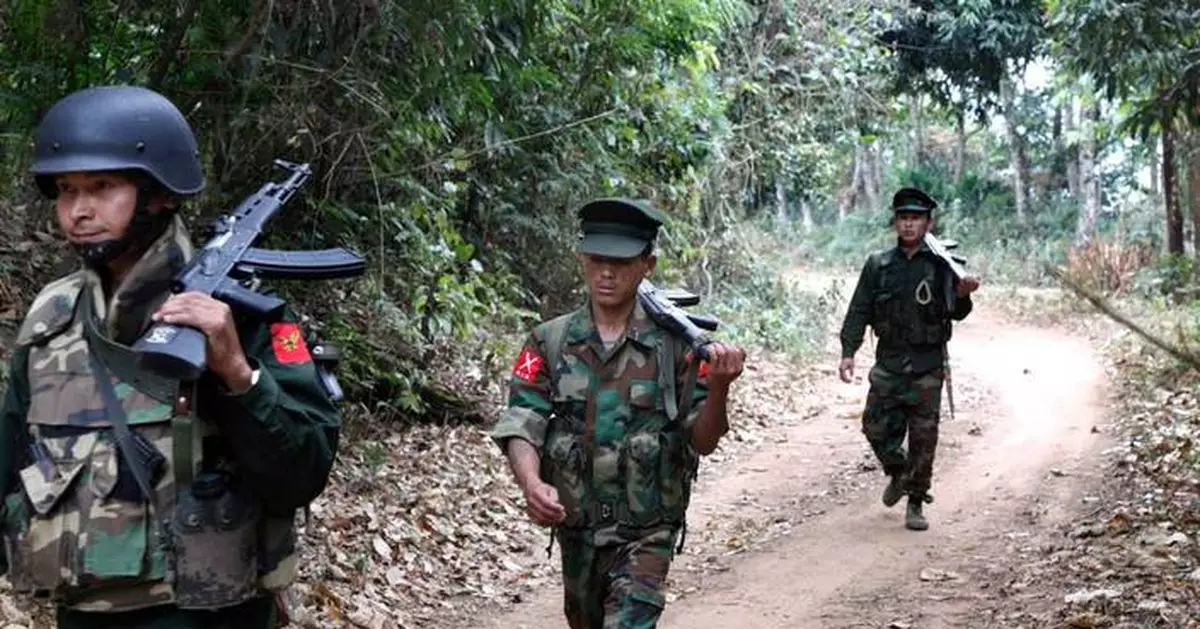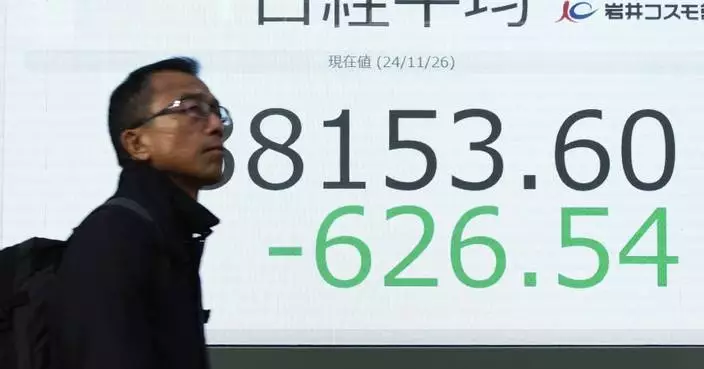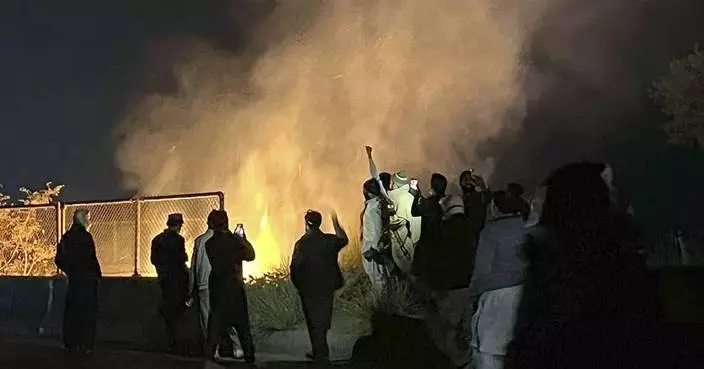BANGKOK (AP) — A powerful rebel group has seized a key trading town in northeastern Myanmar on the Chinese border, taking control of a lucrative rare earth mining hub in another setback for the military-led government, according to witnesses.
The apparent loss of Kanpaiti to the Kachin Independence Army leaves Myanmar's military in control of only one town with a border crossing, Muse, and deprives it of potential profits from the mines that provide China with rare earth minerals critical for electric motors and wind turbines, as well as high-tech weapons and a broad range of electronics.
Neither Col. Naw Bu, the KIA's spokesperson, nor Thet Swe, spokesperson for the military, responded to multiple requests for comment, but several local media outlets reported that Kanpaiti fell last week. The ongoing civil war and military restrictions make travel for journalists nearly impossible, but the reports were confirmed by witnesses by telephone.
Video clips circulating on social media, which could not be independently verified, showed what was said to be a KIA member raising the group's flag at the tunnel through the mountain to China. Other clips showed a vast quantity of weapons allegedly captured by the KIA.
The military seized power from the elected government of Aung San Suu Kyi in February 2021, triggering intensified fighting with long-established armed militias organized by Myanmar’s ethnic minority groups in its border regions which have struggled for decades for more autonomy.
The once-mighty armed forces, known as the Tatmadaw, have suffered a series of unprecedented defeats over the past year, especially in areas to the east near the Chinese border and in the western state of Rakhine, after an alliance of three powerful militias launched a coordinated offensive on Oct. 27, 2023.
Since then, other militias organized along ethnic lines have joined in, including the KIA in the northern state of Kachin.
In Kachin's so-called Special Region 1, where Kanpaiti is located, the KIA since late September has been increasing assaults on a rival ethnic militia, the New Democratic Army-Kachin, which is allied with the government military and had provided border guard forces.
The NDA-K also controlled the web of small, unlicensed operations where heavy rare earth elements are mined, then sold directly to China’s big state-owned mining conglomerates or through intermediaries.
There are more than 300 unregulated mines in the area, producing most of the $1.4 billion in rare earths for sale to China last year “at a terrible cost to the environment and local communities,” according to a report issued by London-based environmental group Global Witness in May.
It's not clear how much of the profits flowed to the military government, and how much directly to the NDA-K, however, and while the loss of any revenue stream would be bad for the military, the fall of Kanpaiti is not necessarily a game changer for the overall conflict, said Morgan Michaels, a Singapore-based analyst with the International Institute of Strategic Studies who runs its Myanmar Conflict Map project.
“This is another series of embarrassing losses for the regime, but may not significantly affect the regime’s ability to wage war,” he said. “China had already shut most of the border to dissuade the KIA’s offensives, and the regime is thought to primarily generate revenue through other means than rare earths.”
China was able to use its close ties to the regime and the Three Brotherhood Alliance groups to broker a ceasefire in January in northern Shan state, where much of the fighting has been. Hostilities resumed five months later after the ethnic alliance said the military had violated the ceasefire and has shown no signs of stopping, despite intense pressure from Beijing.
China has likewise been pushing the KIA in Kachin to end the fighting, which has stopped cross-border trade, to little end.
In its September push, the KIA was able to quickly seize four towns in Kachin, with the exception of Kanpaiti, including the NDA-K headquarters of Pang War.
KIA forces advanced toward Kanpaiti on Nov. 20, and since consolidating control have called for the hundreds of residents who fled to return, a local community leader said, speaking on condition of anonymity for fear of arrest.
The report was confirmed by a spokesperson for Kachin Human Rights Watch, which is not affiliated with the New York-based watchdog group of a similar name, and a resident who saw the KIA troops enter the town. Both spoke on condition of anonymity for fear of arrest by authorities.
Multiple Kachin-based news outlets and other Myanmar media reported that 300 government troops were able to escape by fleeing into China, then crossing back into Myanmar at the regime-controlled border town of Muse.
Kachin Human Rights Watch's spokesperson said he had reports of regime soldiers fleeing to safety, but did not have further details.
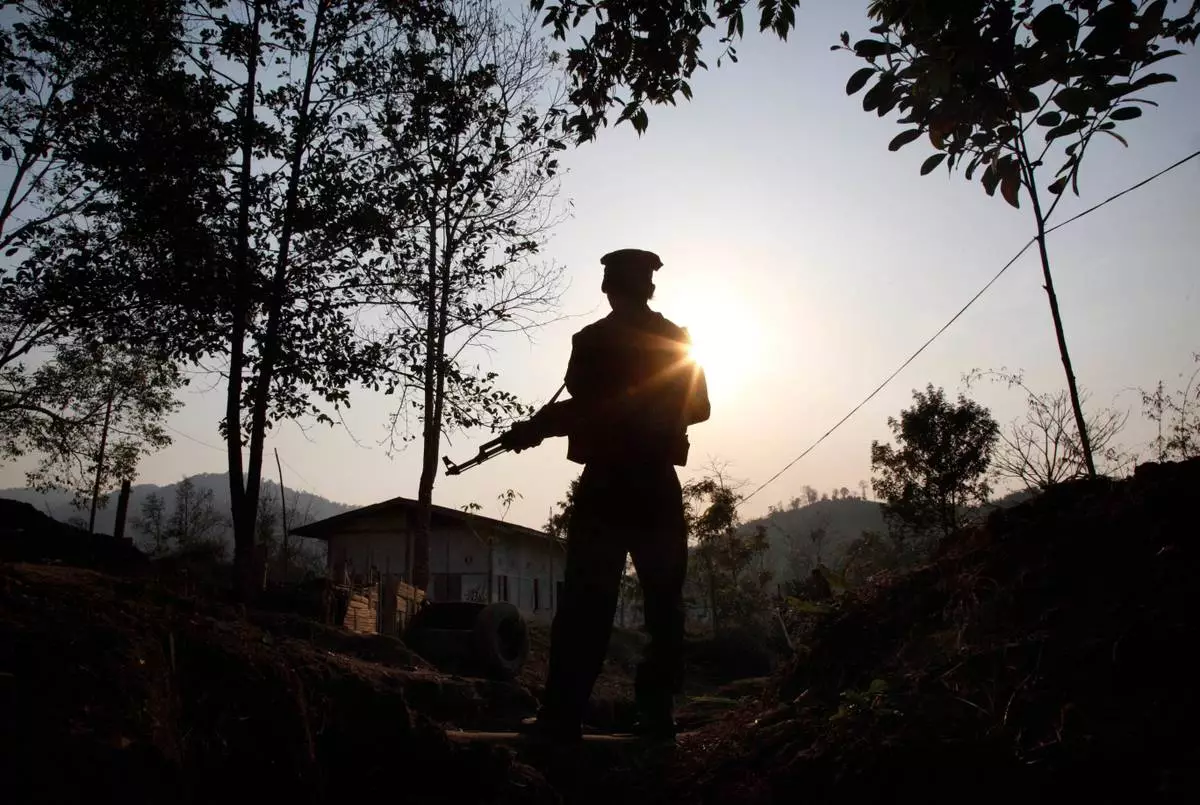
FILE- A Kachin Independence army rebel stands at frontline outpost facing no man's land in Lawa Yang, outside of Laiza, the armed group's headquarters in northern Kachin state, Myanmar, March 20, 2018. (AP Photo/Esther Htusan, File)
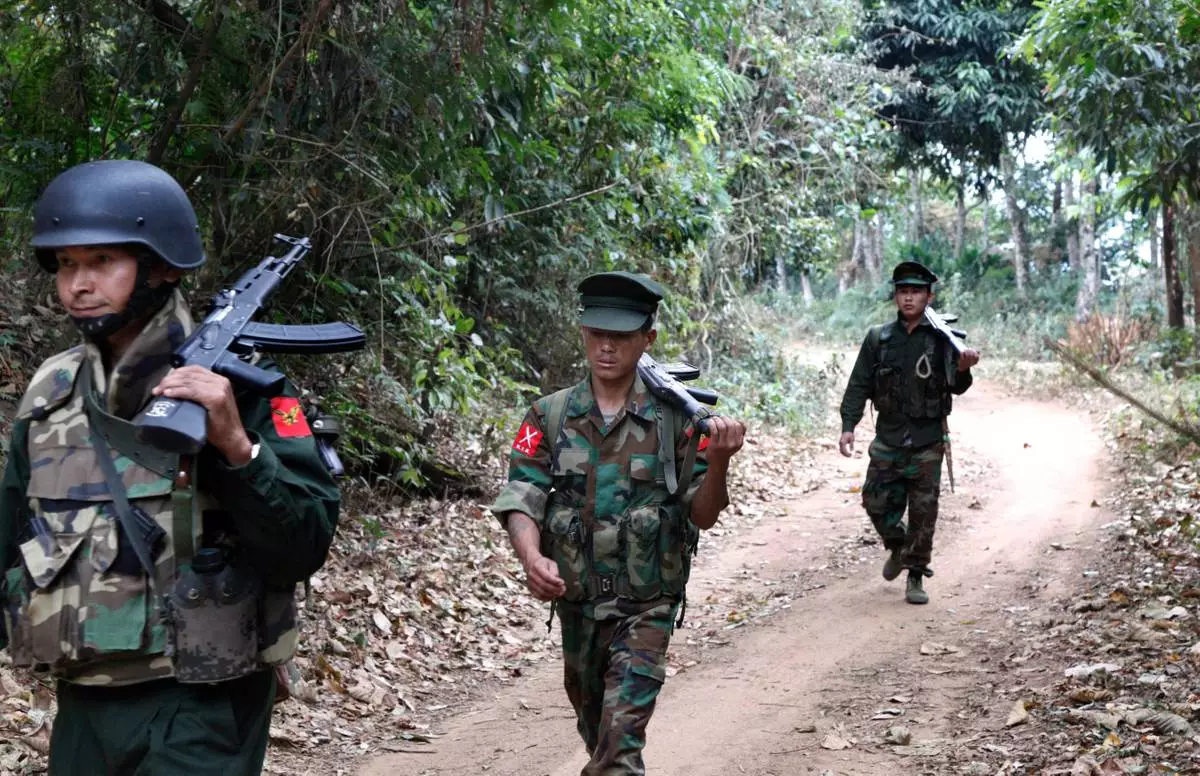
FILE- Kachin Independence Army fighters walk in a jungle path from Mu Du front line to Hpalap outpost in an area controlled by the Kachin rebels in northern Kachin state, Myanmar, March 17, 2018. (AP Photo/Esther Htusan, File)
MANILA, Philippines (AP) — A major political storm set off by a bitter feud between the Philippine president and the vice president is testing an Asian democracy that has long been troubled by rowdy politics, poor law enforcement and bareface impunity.
Just over two years ago, President Ferdinand Marcos Jr. and Vice President Sara Duterte won in landslide electoral victories on a campaign battle cry of national unity.
But their fragile alliance rapidly floundered over major differences, including their leanings toward either the United States or China, and Marcos’ rejection of the bloody crackdown on illegal drugs launched by his predecessor and Duterte’s father, Rodrigo Duterte.
The hostilities came to a head over the weekend when Sara Duterte told reporters she had arranged for Marcos, his wife and his cousin and speaker of the House of Representatives, to be assassinated if she were fatally attacked herself. Marcos went on TV and declared he was ready to fight back.
Here are the key figures in the unfolding political crisis:
Like her father, ex-President Rodrigo Duterte, the 46-year-old lawyer is a populist politician known for profanity-laced outbursts and temper that often clashed with official decorum. She made the political elites wary but endeared herself to ordinary people in a nation where name recall, political patronage and star-studded campaigns matter more than policy and governance platforms. As a provincial city mayor, Duterte successfully ran as Marcos' running mate in the 2022 race. But soon rifts appeared, including Duterte's opposition to congressional inquiries led by Marcos' allies into the thousands of deaths in the crackdown on drugs during Rodrigo Duterte's presidency 2016-2022. Also being investigated is her alleged misuse of funds while she served as education secretary.
When Duterte's chief of staff was temporarily detained by legislators after refusing to cooperate with the inquiry, Duterte made the threats in an online news conference against Marcos, his wife and House Speaker Martin Romualdez. She also accused Marcos’ family of responsibility for the 1983 assassination of an opposition leader, which sparked a 1986 pro-democracy uprising that ousted Ferdinand Marcos, the current president's father.
Marcos' resounding electoral victory in 2022 was regarded as one of the most stunning reversal of fortunes for his family, which had fled the Philippines following the 1986 army-backed “people power” revolt and returned years later. He inherited a battered economy, divisive politics and calls for him help prosecute his predecessor for the drug killings, which are being investigated by the International Criminal Court.
Rodrigo Duterte has accused Marcos of being a weak leader and a drug addict, accusations the president denied. The new course Marcos chartered for the Philippines broke away with Duterte, who built close ties with China and Russia and antagonized the U.S. Marcos broadened defense ties with Washington and began going public with China’s aggressive actions to claim territory in the disputed South China Sea.
In a sign of growing enmity, first lady Liza Araneta-Marcos disclosed her ill-feelings toward Sara Duterte in a radio interview in April. Duterte resigned two months later as Marcos' education secretary and head of an anti-insurgency body. She said last month that her relationship with Marcos had “gone so toxic” she has imagined “cutting his head.” Addressing the country on Monday, Marcos said he would fight the vice president’s “criminal plot” and uphold the rule of law. “The truth should not be summarily executed,” Marcos said in Tagalog, using a term associated with Rodrigo Duterte’s drug killings.
One of Asia’s most unorthodox contemporary leaders until his six-year term ended in 2022, Duterte, 79 and in frail health, has retained a sizable following and remains one of the president's harshest critics. In his decades-long political career, he carved a name for his profanity-laced outbursts and disdain for human rights and the West while nurturing close ties with Chinese President Xi Jinping and Russian leader Vladimir Putin. He has accused Marcos, his wife and the House speaker of financial anomalies and once warned Marcos could be ousted like his father if they attempt constitutional reforms to allegedly prolong their grip on power. In a news conference on Monday, Duterte asked the military how long it would continue to support a president “who’s a drug addict."
“There is a fractured governance … It is only the military who can correct it,” Duterte said, but clarified that he was not calling for a coup.
Widely speculated to be harboring plans to run for the presidency in 2028, House Speaker Martin Romualdez has been accused by Sara Duterte of trying to destroy her reputation to eliminate a future contender. The 61-year-old member of a wealthy clan in the central Philippines, he has played a crucial role as head of the lower chamber, which is dominated by Marcos' allies. He will be key to handling a possible impeachment complaint against the vice president for the alleged misuse of funds. Addressing the House on Monday, Romualdez stressed that Sara Duterte should be held accountable for the death threats against him, the president and his wife. “The gravity of such a confession demands accountability. It demands answers. It demands that we, as the representatives of the Filipino people, take a stand to protect our democracy from any and all forms of threats,” Romualdez said.
Associated Press video journalist Joeal Calupitan contributed to this report.
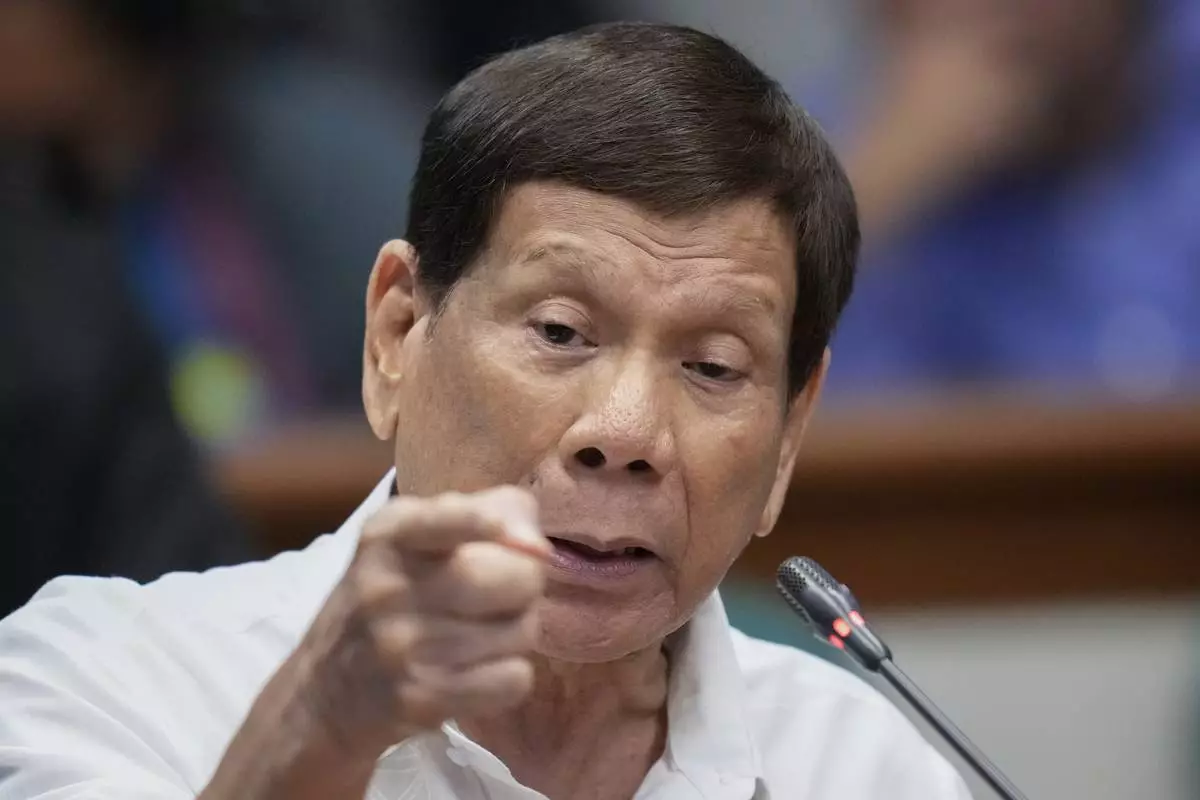
FILE- Former Philippine President Rodrigo Duterte speaks during a senate inquiry on the so-called war on drugs during his administration at the Philippine Senate Monday, Oct. 28, 2024, in Manila, Philippines. (AP Photo/Aaron Favila, File)

FILE - Philippine President Ferdinand Marcos Jr. listens during the 12th Association of Southeast Asian Nations (ASEAN) -U.S. Summit in Vientiane, Laos, Oct. 11, 2024. (AP Photo/Sakchai Lalit, File)

This combination photo shows Philippine Vice President Sara Duterte, left, in Quezon City, Philippines, Nov. 13, 2024, and Philippines President Ferdinand Marcos Jr. in Vientiane, Laos, Oct. 9, 2024. (AP Photo)

FILE - Philippine President Ferdinand Marcos Jr., center right, and Vice President Sara Duterte, daughter of former Philippine President Rodrigo Duterte, raise hands during the inauguration ceremony at National Museum on Thursday, June 30, 2022 in Manila, Philippines. (AP Photo/Aaron Favila, File)




